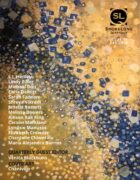There can be so many layers to this story right from the start with a title like Masquerade. The single word evokes trickery, impersonation and imitation. Each of the characters, even those on the periphery, embody this word in some way, but the story itself has hidden intricacies as well. Tell us about your use of this word—and the party setting you’ve chosen—to tell this story of loss.
So glad you asked about setting! This story started in one of Kathy Fish’s extraordinary workshops, and I was struggling with this particular prompt. She’d given us a list of words and phrases meant to help unstick us if we were stuck, and “costume party” elbowed its way in and hung on. I kept imagining the empty shell of some tiny but gallant disguise heaped on the floor, and then it morphed into a literal and figurative place to spotlight all these façades.
I’m fascinated by the things people won’t say and the parts of themselves they hide. I also think there’s a certain pressure to act like we’re “okay” when we’re struggling—even after something truly traumatic, the world tends to allow a short period of mourning and then expects us to get over it. I didn’t choose the title until I’d finished the story and could see the whole picture, which is semi-weird for me. Often a title hits me first.
I’m also kind of obsessed with the idea of shifting identity, especially as it relates to parenthood, and a costume party seemed like an interesting way to explore that. Who are we, really, once we have kids? Everyone says parenthood changes you, and that’s been true for me on an all-consuming, molecular level. I think a lot of parents feel like their identity gets so inextricably tied up with their children that it’s tough to remember who they were before. There can be such a profound loss of self. That entanglement is really beautiful, but it’s also daunting—this is a connection that will color everything for the rest of eternity, in varying shades, whether the kids are in the same room or away at college or emotionally unavailable or physically missing.
You’ve chosen a first-person narration for this story—an interesting choice considering the distance the narrator feels from everyone and everything in her life. She herself feels hidden—yet, a first-person POV can make the reader feel open to the character, even if a certain amount of unreliability is inevitably present. Can you tell us about your POV choice and the spaces in which that unreliability exists?
First-person present is my go-to. I love the intimacy. I think her unreliability exists more in the things she says to her husband and to the other people in her life rather than in what she says to the reader—I wanted the reader to be able to trust her right away, which is partly why she opens with a paragraph about some other times she feels like she screwed up.
There is an overarching unanswered question in the story—one that cannot be answered, only speculated, and it’s what happened to the child. The narrator, however, does not speculate. She doesn’t mention it at all, instead it is only about the loss. What can you tell us about this choice to focus on only this aspect of the character’s experience, leaving out the question on everyone’s mind?
You’re so right! The child’s actual location does feel like a totally peripheral detail lurking in the background. I guess I worried it would read like a condensed whodunit if the narrator focused too much on her daughter’s whereabouts, and in general, I’m drawn to character over plot. The goal here—and in almost everything I write, it turns out—was to examine the complexities of being a parent. The narrator is haunted by sweet moments she’ll never get back as well as her own guilt, so I just tried to write my way into that. I feel like this idea of parental guilt is really pervasive. It dominates everything sometimes, even memories that should be beautiful, and I hate that for us. Too often we fixate on our perceived parenting failures instead of all the things we’ve done right.
Stepping outside of the story a bit, I also want to ask you about the art of writing flash fiction. What is it that you like about writing stories in such a short form? What do you think flash accomplishes that other forms of writing don’t?
Flash is my first writerly love, and it’s great to see it getting so much attention (though not as much as it deserves, in my opinion!). I think my absolute favorite thing is how much you’re allowed to leave unsaid, the way you can pull back just a corner of the curtain to expose something only briefly and then let the reader discover the rest. I especially love a fractured flash—it’s like the best, most intricate puzzle, and it feels so satisfying when each piece fits together in a way that makes the story seem fuller than it actually is, word-wise.
I often take the last question of an interview to ask about favorite authors, but for you—I’d like to know where you read the best flash fiction. Do you have any other literary magazine recommendations for readers who enjoyed your story?
So many. So, so many, and I’m going to accidentally exclude a million of my favorites, I’m sure. In addition to SmokeLong, I drop everything when new stuff comes out in Split Lip, Atticus Review, Longleaf Review, CHEAP POP, Fractured Lit, and Passages North. There’s fantastic work in Wigleaf, X-R-A-Y, jmww, Jellyfish Review, Lost Balloon, CRAFT, Pithead Chapel, Pidgeonholes, and Lunate, plus a dozen others. Two dozen. We have such an exciting wealth of flash right now, and I just want to consume all of it.



 The SmokeLong Grand Micro Contest (The Mikey) is now an annual competition celebrating and compensating the best micro fiction and nonfiction online.
The SmokeLong Grand Micro Contest (The Mikey) is now an annual competition celebrating and compensating the best micro fiction and nonfiction online.